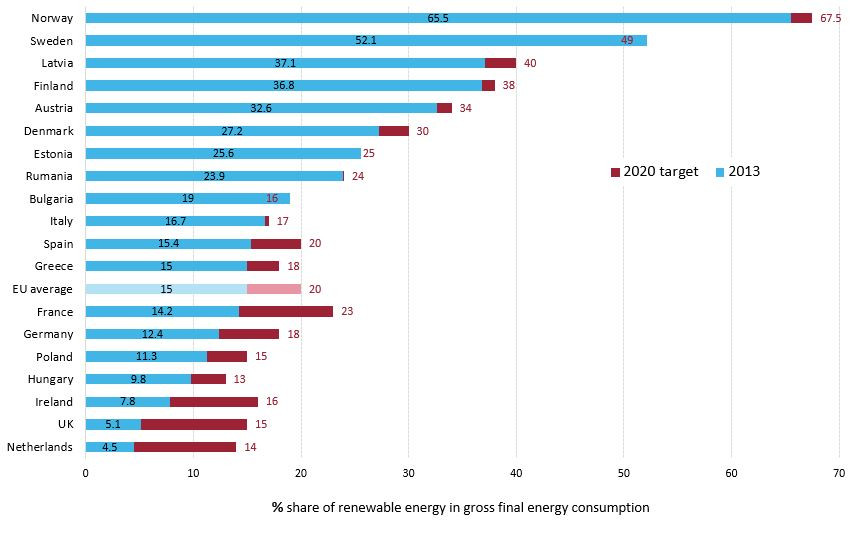In the media: Trend reversal - German emissions decrease
Federal Environment Agency (UBA)
“Trend reversal: Emissions decrease to lowest level since 2010”
German greenhouse gas emissions have decreased in 2014 for the first time in three years, according to calculations by the Federal Environment Agency (UBA). Emissions dropped by 4.3 percent year-on-year or more than 41 million tonnes of CO2 equivalents. Emissions totalled 912 million tonnes last year, a decrease of 27 percent compared to the international base year 2010 and the lowest since 2010. “Finally, the trend points in the right direction,” said environment minister Barbara Hendricks in a statement. “The decrease in 2014 was due in large part to the mild winter. But another part is due to real progress in climate protection.”
Read UBA’s press release here.
Renewable Energies Agency
“Not the all-clear yet: Reaching the climate protection targets requires further effort”
A comparison of scientific scenarios of Germany’s future greenhouse gas balance by the Zentrum für Sonnenenergie- und Wasserstoff Forschung Baden-Württemberg (ZSW) shows that considerable efforts are still needed to reach the CO2 reduction targets by 2020. “Even new figures from the Federal Environment Agency (UBA) showing that Germany’s greenhouse gas emissions are decreasing again for the first time in years doesn’t mean we can let up now,” Philipp Vohrer, managing director of the Renewable Energies Agency (AEE) who commissioned the analysis said.
See the AEE press release in German here.
Download the analysis in German here.
dpa/afx
“Green Party: Closure of E.ON gas-fired plant in Irsching is confession of failure”
The German Green party considers the operators’ decision to mothball the highly efficient gas-fired power station in Irsching a setback for the Energiewende. “It’s a concession of failure if CO2-saving technologies reach their economic limits while old, climate-killing coal plants remain connected to the grid”, said the party’s head, Simone Peter, according to a dpa/afx report. Main operator E.ON notified the Federal Network Agency it intends to close the Bavarian plant because it sees no prospect of operating it profitably.
Read the dpa/afx report in German here.
Read a news report about the operators’ notification here.
Börsen-Zeitung
“Confused Energiewende”
The Irsching plant is increasingly becoming a symbol for the fact that something has gone wrong with the Energiewende, writes Andreas Heitker in a commentary for the Börsen-Zeitung. It is not to be expected that one of Europe's most modern power stations will be switched off for good because it is much too important for the stability of the electricity grid in the south of Germany, argues Heitker. But for the operators it might be the best option to mothball the plant and reactivate it in five years’ time. By then, the pending redesign of the power market might have made it profitable again, writes Heitker.
Read the commentary in German here.
Read a CLEW factsheet on the pending reform of the power market here.
Institute for Advanced Sustainability Studies (IASS Potsdam)
Power to gas and power to liquid strong options but “no silver bullet”
Power to liquid and power to gas technologies to store intermittent renewable energy sources can contribute to a future sustainable energy system in Germany, according to a technical analysis by the Institute for Advanced Sustainability Studies (IASS Potsdam). Those schemes “are a strong candidate option” for achieving emission targets in 2050, according to the authors. But this conclusion requires fairly extreme assumptions about the future deployment of renewable energies. This is why the authors do not consider these technologies a “silver bullet” solution.
Find the study in English here.
Zeit Online / Eurostat
“Sweden – Germany 52:12”
Using recent data for the year 2013 from the European statistics agency Eurostat, Zeit Online says Germany is not the “showcase country” in Europe when it comes to the share of renewables in gross final energy consumption – many countries are doing better. Some (like Sweden, Estonia, and Bulgaria) have even already reached their 2020 targets (See Figure). Final energy consumption includes energy for heating and transport as well as electricity consumption. The countries with the highest share of renewables in this category (e.g. Norway, Sweden) have traditionally a very high proportion of hydropower which is also used for heating.
See the Zeit Online article in German here.
See the Eurostat data on EU plus Norway in German here.
IWR
“Renewables and EU: Auctions not mandatory for legal reasons”
The obligation to support renewable development through auctions or tenders rather than feed-in tariffs as used in Germany’s Renewable Energy Act (EEG) is not legally mandatory under EU competition law, Thorsten Müller, environment and energy lawyer from the Stiftung Umweltenergierecht, said according to IWR News. The EU directive on renewable energy promotion offers the member states a free choice between different support systems, Müller argues. The EU Commission’s guidelines on state aid for environmental protection and energy 2014-2020 cannot restrict this freedom, he says, concluding that obliging member states to use tenders was contrary to EU law but that the rule would remain in place until a member state took legal action against the Commission in such a case.
See the IWR article in German here.

